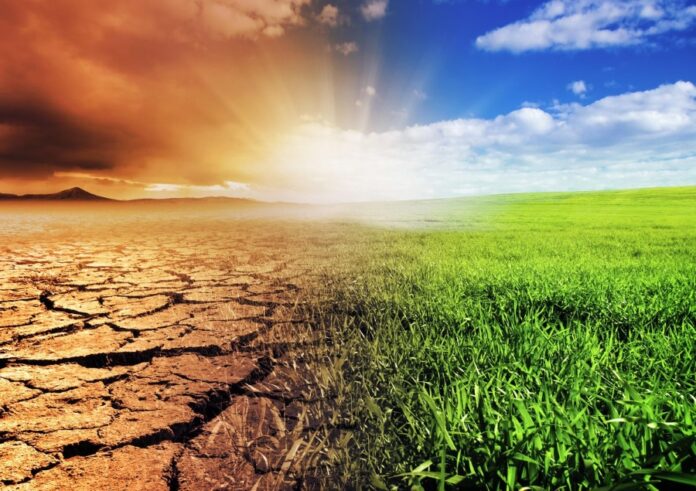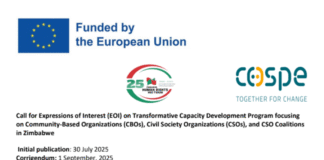Illustrative Image: Climate Change Adaptation and Disaster Risk Reduction in Africa: A Comprehensive PRISMA Review
Image Source & Credit: East African Community.
Ownership and Usage Policy
A recent study by Saber et al. (2025) titled “A comprehensive review of climate change adaptation and disaster risk reduction in Africa” published in Journal of Water and Climate Change reveals that Africa is already experiencing significant impacts from climate change—such as extreme weather events, agricultural disruption, and land degradation
“
Africa faces severe climate impacts, but adaptation efforts are hindered by weak institutions, limited funding, and insufficient regional cooperation.
– Saber et al. 2025
This study is a comprehensive review of climate change adaptation and disaster risk reduction (DRR) efforts across 12 African countries, including Uganda, Nigeria, Ghana, Sierra Leone, Senegal, Benin, Ethiopia, Comoros, Malawi, Mali, the Democratic Republic of Congo, and Kenya. Using the PRISMA framework, the researchers analyzed 257 peer-reviewed studies and identified key themes such as climate-related disasters, biophysical vulnerabilities, socio-economic impacts, national adaptation plans, and adaptation measures. The findings highlight how climate change has already affected these countries, with Uganda, Ethiopia, and Malawi facing severe flooding and droughts, while Mali and Senegal struggle with desertification. Agricultural challenges due to droughts are prevalent in Nigeria, Kenya, and Mali, necessitating resilient crops and improved irrigation methods. The study emphasizes regional cooperation, particularly for transboundary risks like Congo Basin floods, and underscores the importance of scaling up climate finance in countries like Ghana and Sierra Leone. Strengthening health systems to combat climate-sensitive diseases is also a major recommendation. Common barriers to effective adaptation and DRR include weak institutional capacity, limited funding, and low public awareness.
How the Study was Conducted
This study employed a systematic review methodology guided by the PRISMA framework (Preferred Reporting Items for Systematic Reviews and Meta-Analyses) to assess climate change adaptation and disaster risk reduction (DRR) efforts across 12 African countries: Uganda, Nigeria, Ghana, Sierra Leone, Senegal, Benin, Ethiopia, Comoros, Malawi, Mali, the Democratic Republic of Congo, and Kenya. These countries were selected to represent a broad spectrum of geographic, ecological, socio-economic, and political conditions—capturing varying degrees of vulnerability to climate-related hazards. An extensive literature search was conducted using multiple academic databases, including Scopus, Web of Science, Google Scholar, and ResearchGate. Carefully constructed search strings combined relevant keywords such as climate change adaptation, disaster risk reduction, and climate mitigation with Boolean operators (“AND,” “OR”) to narrow and refine results. The initial search identified 674 records. These were rigorously screened in several stages: Duplicates and irrelevant studies were removed, exclusions included non-peer-reviewed papers, book chapters, literature reviews, and unpublished documents.
Data from the selected studies were extracted and categorized into key thematic areas: Climate-related disasters, such as floods, droughts, and extreme temperature events, biophysical vulnerabilities, examining the exposure of ecological and physical systems, Socio-economic impacts, assessing how climate stressors affect livelihoods, infrastructure, and economic stability, National Adaptation Plans (NAPs), evaluating the effectiveness and implementation of policy frameworks, Adaptation measures, identifying both successful strategies and the challenges encountered, Historical climate data, including trends in temperature and rainfall patterns, were also analyzed to contextualize the findings within each country.
To ensure the validity and robustness of the review, thematic coding was employed for data organization. Additionally, citation tracking—both backward (references cited by included studies) and forward (studies citing the included ones)—was used to identify supplementary relevant literature. The entire review process followed the PRISMA flowchart, ensuring a systematic, transparent, and replicable approach to study selection and synthesis.
What the Authors Found
The authors found that Africa is already experiencing significant impacts from climate change—such as extreme weather events, agricultural disruption, and land degradation—but efforts to adapt and reduce disaster risk are hindered by limited funding, weak institutions, low public awareness, and fragmented regional cooperation. Addressing these barriers is critical for building resilience across the continent.
Why is this important
Protecting Lives and Livelihoods: Climate-related disasters—such as floods, droughts, and extreme heat—are already affecting millions of people across Africa. Without proper adaptation strategies, communities will continue to suffer from food insecurity, displacement, and economic hardship.
Strengthening Climate Resilience: The study identifies gaps in disaster risk reduction (DRR), such as weak institutional capacity and limited funding, which hinder effective responses to climate threats. By addressing these challenges, governments and stakeholders can build stronger, more resilient communities.
Informing Policy and Decision-Making: The research provides evidence-based insights into what works and what doesn’t in climate adaptation efforts. Policymakers can use these findings to implement more effective strategies tailored to local conditions.
Encouraging Regional Cooperation: Many climate challenges—like transboundary floods and desertification—go beyond national borders. The study underscores the importance of countries working together to tackle shared risks through collaborative climate action.
Advocating for Climate Finance: The study emphasizes the need to scale up climate finance, especially in countries like Ghana and Sierra Leone. Increased funding can support innovative adaptation projects, sustainable infrastructure, and community-based solutions.
Promoting Sustainable Development: Addressing climate change is crucial for Africa’s long-term economic stability. Sustainable practices in agriculture, energy, and land use can help boost productivity, create jobs, and protect ecosystems.
Raising Awareness: Public awareness and education play a key role in disaster preparedness and adaptation efforts. The findings stress the need for more community engagement to ensure people understand climate risks and take proactive measures.
What the Authors Recommended
- The authors advocate the need to invest in satellite-based monitoring, community observation networks, and improved meteorological services to provide timely and accurate forecasts for floods, droughts, and other climate-related hazards.
- The authors emphasize the need to scale up funding for climate resilience projects, particularly in vulnerable countries, and improve access to international adaptation and mitigation finance mechanisms.
- Enhance institutional frameworks and coordination between national and local governments to effectively implement and enforce climate and disaster risk policies.
- The study also emphasizes support the adoption of drought-resistant crops, modern irrigation, agroforestry, and sustainable land-use practices to protect food security and combat desertification.
- In addition, strengthen collaboration across borders to address shared climate risks, such as flooding in the Congo Basin, and encourage the exchange of best practices among African nations.
- Furthermore, improve healthcare systems to address climate-sensitive diseases and launch grassroots education programs that engage communities in adaptation and disaster preparedness efforts.
In conclusion, the study by Saber et al. (2025) provides a critical and timely analysis of climate change adaptation and disaster risk reduction across diverse African contexts. By highlighting both the urgent challenges and promising strategies, it underscores the need for increased investment, stronger institutions, regional cooperation, and community engagement. As the continent continues to face escalating climate threats, translating these insights into action will be essential for safeguarding livelihoods, enhancing resilience, and securing a sustainable future for all Africans.
















 The African Research (AR) Index is a comprehensive scholarly directory and database focused explicitly on journal publishers that publish and disseminate African research.
The African Research (AR) Index is a comprehensive scholarly directory and database focused explicitly on journal publishers that publish and disseminate African research.

